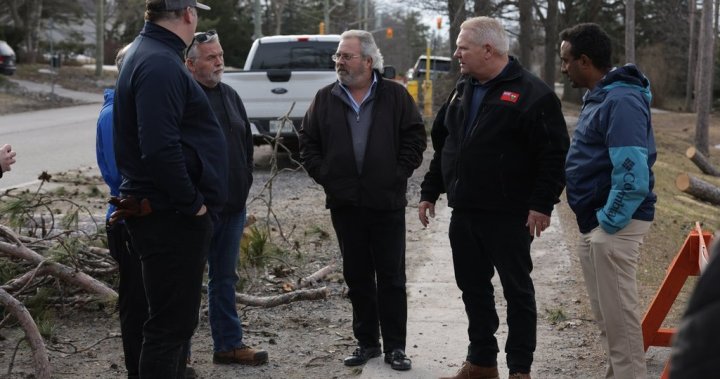The devastating pre-Christmas ice storm that left thousands of Ontarians without power for days will now see financial relief flow to affected communities. Premier Doug Ford announced yesterday a comprehensive $20 million recovery package aimed at supporting municipalities, small businesses, and residents still grappling with the aftermath of one of the province’s worst winter storms in recent memory.
“This wasn’t just any winter weather event,” Ford stated during a press conference in Milton, one of the hardest-hit communities. “The combination of freezing rain, ice accumulation, and high winds created extraordinary damage that overwhelmed local resources and left communities struggling to cope with cleanup costs.”
The funding package includes $12 million directed specifically to municipalities for infrastructure repairs, emergency response reimbursement, and debris management. The remaining $8 million establishes a small business recovery fund that will provide grants of up to $15,000 for eligible businesses that experienced significant physical damage or extended closures.
Municipal leaders across southern Ontario have welcomed the announcement, with many having publicly appealed for provincial assistance in recent weeks. Burlington Mayor Marianne Meed Ward described the funding as “essential for our recovery efforts,” noting that her city’s cleanup costs had already exceeded $3.5 million.
The December 23rd storm caused widespread power outages affecting more than 200,000 homes and businesses across southern Ontario. Hydro crews worked through the holidays, but some residents remained without electricity for up to five days. The combination of freezing rain and winds created dangerous ice accumulations that brought down countless trees and power lines.
For affected small business owners like Sarah Chen, who operates a bakery in Oakville, the relief can’t come soon enough. “We lost our entire holiday inventory when the power failed,” Chen told CO24. “Between the spoiled goods, cancelled orders, and repairs to our damaged storefront, we’re looking at losses exceeding $20,000.”
The Ministry of Municipal Affairs has established a dedicated portal where municipalities can submit their recovery plans and expense documentation. Small business applications will open next week through a separate online system managed by the Ministry of Economic Development.
Critics, however, question whether the funding package goes far enough. Opposition leader Marit Stiles called the amount “inadequate given the scale of damage,” and pointed to climate change as a factor increasing the frequency and severity of such events.
“What we’re seeing is the new normal,” said Dr. Ellen Thompson, a climate scientist at the University of Toronto. “These extreme weather events are becoming more common, and our infrastructure planning needs to account for this reality.”
The province has indicated that applications for municipal funding will be processed on a priority basis, with initial payments expected to begin flowing within 30 days. Communities can access additional information through their regional Ontario government offices.
As cleanup efforts continue across the region, questions remain about how Ontario will prepare for future extreme weather events. Will this recovery funding serve as a template for responding to climate-related emergencies, or will we need more comprehensive strategies to build resilience against increasingly unpredictable weather patterns?


















